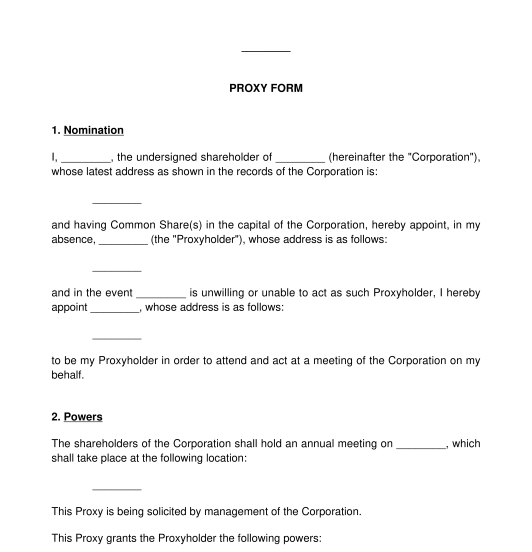 31/12/2024
31/12/2024

Answer a few questions and your document is created automatically.

Your document is ready! You will receive it in Word and PDF formats. You will be able to modify it.

A proxy form (or form of proxy) is a document used when a shareholder of a corporation will be absent from a meeting and requires someone else to attend the meeting and make a decision. A form of proxy must be in writing. A shareholder unable to attend a corporation meeting needs to designate a reliable proxy to vote on their behalf. This chosen individual should be someone trustworthy.
The shareholder signs the document and names a person who will act on their behalf. The person acting on the shareholder's behalf is called a proxyholder (or proxy).
No. Having a Proxy Form for a private corporation is not mandatory, but it is a critical document to be used in situations where important decisions need to be made and a shareholder cannot be present.
A Proxy Form should contain the absent shareholder's name, address and capital in the corporation. The absent shareholder will name someone to attend the meeting on their behalf, and may also name a second person. The shareholder will also outline the proxyholder's powers and how to cast their vote at the meeting. Lastly, the document should also contain the address at which this document is to be deposited.
Only an existing shareholder of the corporation who is entitled to vote at the upcoming meeting can appoint a proxy. An existing shareholder is an individual or corporation that has voting shares in the corporation with an upcoming meeting.
A Proxy Form is only valid for the meeting in which it is used. After the completion of the meeting, the proxy can no longer be used. In other words, any time a corporation has an upcoming meeting, a new proxy form will need to be used for that specific meeting. Once the meeting is completed, the proxy form is no longer effective.
Once the Proxy Form is ready, the document can be signed either physically or electronically. Once the document is signed and deposited with the corporation, any prior proxies that have been signed are revoked. This means that the most recently signed proxy takes effect.
Normally, the signed proxy must be deposited with the corporation some time before the meeting (usually no more than 48 hours before the meeting). After the meeting has taken place, the corportion must keep in its minute book the proxy form as a record of the actions taken.
No. Registering the Proxy Form isn't necessary, however the signed document must be deposited with the corporation. Additionally, all signed proxies will need to be placed in the corporation's minute book (a binder with documents of the organization) to ensure a record of the transaction is logged. The minute book can be stored physically, electronically, or both.
Proxies must comply with corporate law, which is governed by federal law, each Province's legislation and case law. The pieces of legislation governing Corporate Bylaws are as follows:
Proxies may also be subject to the corporation's bylaws, which may have specific requirements.
You fill out a form. The document is created before your eyes as you respond to the questions.
At the end, you receive it in Word and PDF formats. You can modify it and reuse it.
Proxy Form - Template, online sample - Word & PDF
Country: Canada (English)